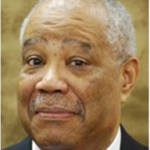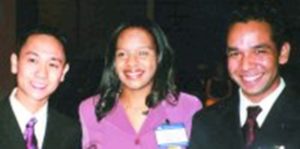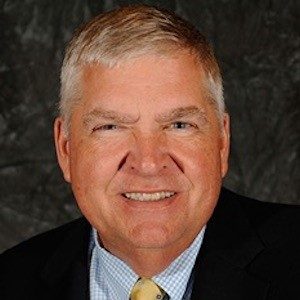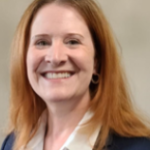After being incorporated in 2000 as a Virginia non-stock corporation, the initial organizational work of the Foundation for Advancement of Diversity in IP Law began in early 2001. The Founding Trustees of the newly formed “AIPLA Foundation”—later to become the American Intellectual Property Law Education Foundation — met in February 2001 to establish three “working committees” to shepherd the development of programming for the new organization. Much like the focus of the Foundation today, these early committees were charged with addressing “Scholarships,” “Recruitment,” and “Fundraising and Promotion”.
The Founding Trustees in 2001 included prominent leaders in the IP bar, most notably Baila Celedonia, Ron Myrick, Rick D. Nydegger, Roger W. Parkhurst, Bill Rooklidge, and Tom Smith—each of whom had served as either President of the American Intellectual Property Law Association or Chair of the Section on Intellectual Property Law of the American Bar Associations. Leading the Foundation as its first president was another professional prominent in the IP community, Anthony Greene.
The impetus for the creation of this new “diversity foundation” arose from committee work within the AIPLA. The AIPLA’s Standing Committee on Diversity in IP Law had been successful in raising awareness of the need to address underrepresentation of certain racial and ethnic groups within the IP bar. Within AIPLA, Clyde Bailey, Mel Garner, Phil Hampton, and Sid Williams had each played an active role as diversity advocates on the Committee and within AIPLA more broadly. These leaders, using their considerable influence to challenge the Association to elevate the priority of its diversity and inclusion efforts, made a simple pitch to other AIPLA leaders: The Association needed to do more than any one committee of AIPLA could ever accomplish if meaningful progress towards a more diverse IP bar were to be realized. Their vision was a separate organization, separately governed, and more broadly financed, with the single-minded focus to expand diversity and inclusion programs and activities to a scope that reflected the magnitude of the challenge presented.
Their proposal to the AIPLA Board of Directors was no less simple and direct: create a new foundation solely devoted to advancing racial and ethnic groups underrepresented in the IP law profession. Andrea Ryan, then the President of AIPLA, became a lead champion for this proposal. Her support helped to assure that AIPLA would move forward to make the needed investments for the Foundation to exist as a separate legal reality. Her efforts in support of the new Foundation also helped to assure that prominent members of the IP bar would serve as its Founding Trustees. In 2002, Andrea would become the second Foundation president, succeeding Anthony Greene.

One of the first orders of business for the new Foundation was eliciting support for this new organization from the Section on Intellectual Property Law of the American Bar Association. From the beginning, the leadership of the Foundation envisioned the Foundation as a pan-IP-bar effort at marshaling talents and financial resources to take action to address under-representation. Almost immediately, the approach to the ABA bore fruit, with the Section on IP Law agreeing to become a second Founding Bar Association of the Foundation, along with AIPLA.

The IPL Section’s interest was triggered in large part by the early decision of the Foundation Trustees to proceed with a new tuition grant program, the “Sidney B. Williams, Jr. Scholar Program.” Sid Williams had served as a highly respected leader within the IP Section for many years and the Section’s early involvement was an opportunity to recognize his pioneering involvement in the leadership of the Section.
The Trustees of the new foundation, at the urging of President Greene, sought out an immediate partnership with the Minority Corporate Counsel Association. Together with the AIPLA and IPL Section, the MCCA would become a third founding organization of the Foundation.
In order to further the cooperative relationship with these groups, each of these three founding organizations agreed to permanent involvement in the leadership of the Foundation through participation on the Board of Trustees for the Foundation. This is a role that each of these founding organizations continues to play in the governance of the Foundation today.
The Foundation’s initial efforts at recruitment of Scholars for its new Sidney B. Williams, Jr. Scholar Program were a smashing success. The Foundation received 95 applications during the first year of this new Scholar program and eventually named nine individuals as Sidney B. Williams, Jr. Scholars for the 2002-2003 academic year. Notably, in this very first class of Scholars were two awardees who would go on to become members of the Board of Trustees for the Foundation.


As President Greene noted at the time, “We did not expect the large number of applications we received, nor the number who were so highly qualified. We had planned to award only three scholarships in our first year but found at least 20 applicants who showed promise of making significant contributions to the IP law field.” Without question, the new foundation was off to an impressive start.
Phil Johnson, J&J’s chief IP counsel and Roger Fine, J&J’s General Counsel, became early corporate champions of the Foundation’s efforts. In a remarkable display of generosity, Johnson & Johnson agreed to provide an initial $100,000 seed donation to the Foundation, which would be followed in future years by equally generous leadership support for the Foundation. This early—and continuing—confidence J&J would show in the Foundation all but assured the financial viability of the nascent organization.
The following year was a similar success for the Scholar Program, with another ten $10,000 tuition grants being awarded. The Foundation was able to achieve these early successes in large measure because, even in its very earliest days, it was blessed with the generosity of the law firms and companies that had a shared passion for the inclusion mission of the Foundation. Foremost among these early donors was Johnson & Johnson.
The support over the years by Johnson & Johnson has extended beyond financial contributions. Phil Johnson, and now Robert DeBerardine, who currently serves as J&J’s chief IP counsel, have sequentially served as the Chair of the Foundation’s Board of Trustees during the past two decades. For all of its efforts, Johnson & Johnson has been long recognized as the “Founding Corporation,” making it the fourth of the founding organizations of the Foundation.

The Foundation’s Sidney B. Williams, Jr. Scholar Program has remained the flagship program of the Foundation since the announcement in 2002 that nine students were being recognized as Scholars. In order to assure that the Scholar Program could be efficiently administered, the Foundation maintained a partnership with the Thurgood Marshall College Fund for several years under which TMCF had responsibility for the administrative aspects of the Scholar Program, including the application process and grant administration. Since the start of 2021, the Foundation has handled these administrative aspects of its Scholar program internally.
The support over the years by Johnson & Johnson has extended beyond financial contributions. Phil Johnson, and now Robert DeBerardine, who currently serves as J&J’s chief IP counsel, have sequentially served as the Chair of the Foundation’s Board of Trustees during the past two decades. For all of its efforts, Johnson & Johnson has been long recognized as the “Founding Corporation,” making it the fourth of the founding organizations of the Foundation.

Over the past two decades, one clear measure of the impact of the Foundation can be found in the more than $2,500,000 of tuition grant assistance provided under the Sidney B. Williams, Jr. Scholar Program to nearly 150 Scholars. To build on the continuing success of the Scholar Program, the Foundation took several actions in 2019 that changed the focus of the program and expanded the benefits available to Scholars under the program.
Beginning with the 1L class entering law school in 2020, the Foundation focused the Sidney B. Williams, Jr. Scholar Program on career preparation and career readiness—getting Scholars poised for success in their careers in patent law. Today, the program serves STEM-educated individuals seeking to explore a career in patent law. The first class of 10 new Scholars under this refocused and enhanced program began their law school careers in 2020. Scholars participating in the revitalized program now receive formal mentoring assistance, complete financing of the law school application process, support for identifying 1L and 2L patent internships and clerkships, assistance to take and pass the patent bar, support for participation as student members in meetings of the AIPLA and ABA IPL Section, and other opportunities for making connections with leaders in the patent law community.
In addition, during 2020, the Foundation engaged the services of a Program Manager to take charge of the administrative aspects of the Scholar Program and assist with the expansion of fundraising efforts that will be needed to support the objective of the Foundation to support as many as 25 new Scholars each year entering law school to explore a career in patent law.
Finally, in 2020, the Foundation adopted a more descriptive name. The new Foundation name was selected to underscore a continuing commitment to a single-minded mission: advancement of diversity in IP law.
With the continuing help and support of partners across the IP law community, the Foundation’s history is but prologue, with the best from its investments in the future of the IP law profession yet to come.
Hall of Presidents
The Foundation is particularly indebted to the individuals who have served as Foundation Presidents during the past two decades. They have ably led the Foundation since its inception:

Anthony Greene (2000 to 2002)

Andrea Ryan (2002 to 2004)

John Delehanty (2004 to 2007)

Phillip Hampton, II (2007-2011)

David Highet (2011 to 2013)

Stasia Ogden (2013 to 2017)

Diallo Crenshaw (2017 to 2019)

Terry Rea (2019 to 2021)

Robert Armitage (2021 to 2022)

Keisha Hylton-Rodic (2022 to 2023)

Sharon Israel (2023 to current)
